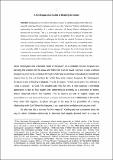Files in this item
A Kierkegaardian guide to reading scripture
Item metadata
| dc.contributor.author | Torrance, Andrew Bartholomew | |
| dc.date.accessioned | 2018-06-10T23:36:59Z | |
| dc.date.available | 2018-06-10T23:36:59Z | |
| dc.date.issued | 2016-09 | |
| dc.identifier | 243086346 | |
| dc.identifier | bbce6306-3cf9-4795-ae0f-e6f631d8de25 | |
| dc.identifier.citation | Torrance , A B 2016 , ' A Kierkegaardian guide to reading scripture ' , New Blackfriars , vol. 97 , no. 1071 , 7 , pp. 624-639 . https://doi.org/10.1111/nbfr.12226 | en |
| dc.identifier.issn | 0028-4289 | |
| dc.identifier.other | ORCID: /0000-0001-5604-8247/work/61133144 | |
| dc.identifier.uri | https://hdl.handle.net/10023/13869 | |
| dc.description.abstract | Kierkegaard is well known for being critical of a scholarly reading of the bible. It is generally understood that his primary concern was that “objective” biblical scholarship was undermining the possibility of a reader’s subjective life being affected, challenged and provoked by its message. That is, it encourages an overly detached reading of Scripture that distracts persons from responding to its call to discipleship. It is indeed the case that Kierkegaard devoted himself to challenging the fact that the nominal Christians in Denmark were not actively responding Scripture. However, I shall argue that there is something much more fundamental to his critique of biblical scholarship. For Kierkegaard, the faithful reader is not primarily called to respond to the message of Scripture but to the living God who communicates to persons through Scripture. This paper will look at how Kierkegaard sought to remind Christians that Scripture is not an end in itself but a witness to the living God (who is the primary focus of the Christian life). | |
| dc.format.extent | 15 | |
| dc.format.extent | 363615 | |
| dc.language.iso | eng | |
| dc.relation.ispartof | New Blackfriars | en |
| dc.subject | Kierkegaard | en |
| dc.subject | Hermeneutics | en |
| dc.subject | Bible | en |
| dc.subject | Scripture | en |
| dc.subject | Faith | en |
| dc.subject | Theology | en |
| dc.subject | BS The Bible | en |
| dc.subject.lcc | BS | en |
| dc.title | A Kierkegaardian guide to reading scripture | en |
| dc.type | Journal article | en |
| dc.contributor.institution | University of St Andrews. School of Divinity | en |
| dc.identifier.doi | 10.1111/nbfr.12226 | |
| dc.description.status | Peer reviewed | en |
| dc.date.embargoedUntil | 2018-06-10 |
This item appears in the following Collection(s)
Items in the St Andrews Research Repository are protected by copyright, with all rights reserved, unless otherwise indicated.

